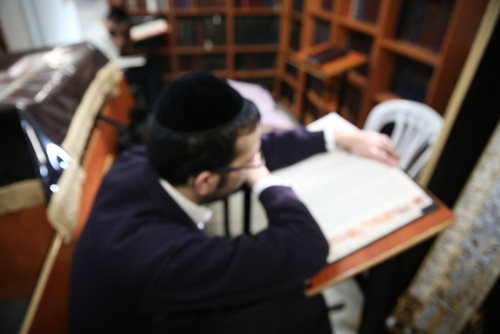< Lesson 16: Common Mishaps at the Shabbos Table
Lesson 17: Dessert and Cleanup – Muktzah, Borer, and More
An Introductory Law
Welcome to my home, where in Lesson 17, we are going to recreate the end of a Shabbos meal. We are going to serve and eat dessert and show how to properly clear off the table on Shabbos. In my home, before we serve dessert, we usually read from a sefer, from a book, some of the laws of Shabbos. We’re currently using Rabbi Daniel Braude’s Learn Shabbos in Just Three Minutes a Day, by Feldheim Publishers. I’d like to read one paragraph which is relevant to the topic of today’s lesson.
Although we have seen that Muktza items may not be handled and moved, Chazal, our rabbis, incorporated a few exceptions. When one is disgusted by the presence of something, one may move it even if it’s muktzah. Included in this leniency is something that is a genuine eyesore, is making disturbing noise, has a bad smell, or would cause embarrassment from visitors.
A few examples: a dead animal. If there’s a dead mouse in the house, even though the dead mouse is muktzah, one is allowed to remove it because it would be disturbing to have it. Dirty plates, refuse, bones, and fruit and vegetable seeds, a smelly diaper. These things are muktzah; they have no use. However, because they are disgusting, Chazal permitted moving them out of sight. We will discuss this in the lesson as we go by.
Dessert in Abundance!
So I’m going to start my dessert. I’m going to have some pistachio nuts. And I think I’ll take a piece of pumpkin cake.
Blessing During the Meal?
Rabbi Rappaport makes a bracha (blessing): Baruch atah Ado-noi Elo-heinu Melech haolam Borei pri ha’eitz.
You might be asking, why did I say a bracha on the pistachio nuts? We know that when you eat a meal where you wash and you say hamotzi over bread, the bread covers the meal food and you don’t have to say a bracha on it. That’s true. However, according to most opinions, most dessert foods are not covered by the bracha. If you want guidance with this, discuss it with your rabbi. You can also email me or see chapter 33 of Halachic Discussions on Hilchos Shabbos by Rabbi Doniel Neustadt (Machon Ohr Olam).
Dealing with Muktzah Shells and Peels
So now, eating pistachio nuts brings up a question. The shells are muktzah. These are things that have no use. They’re objects that we’re not supposed to handle on Shabbos. When you open up a pistachio nut, you’re taking the meat out, you’re eating it, that’s fine. But what do you do with the muktzah object?
Moving it Indirectly – Tiltul Min Hatzad
The muktzah object that’s in your hand may be handled till you put it down. The recommended thing to do is to put it on a plate. This way, when you’re clearing off the table, you’re not going to have to pick up the muktzah object in your hand. You’ll be able to do what we call tiltul min hatzad. You’re going to pick up the plate, and only indirectly carry the muktzah and put the plate in the garbage. That’s not going to be a problem. This is as far as this.
Now I’d like to do something similar; I’d like to eat a clementine. We have the exact same thing with the clementine. You peel a clementine. So the clementine is something that you eat – the fruit of the clementine – but the peel of the clementine is not something that’s edible. Maybe orange peels are edible, but clementine peels are bitter.
If I was to put this down on the table, oh no! This is now something that’s muktzah that’s on the table. We’ll have to see when we clear off the table how we’re going to have to deal with that. I put most of the peel on the plate. We’ll do tiltul min hatzad, and that will be okay.
Select the Best!
Another issue I want to talk about in this lesson is borer. In previous lessons we discussed borer, selecting bad (psoles) from good (ochel), and taking edible from not edible. This is something that has to be done properly on Shabbos. We said in a previous lesson, the simple formula to remember is ochel, b’yad, miyad. Ochel – you’ll have to take the part that you want, the food, from the non-food, from the non-edible, b’yad – by hand and not with an implement, miyad – for immediate use.
So if you notice over here, there is an assortment of cookies. There are chocolate cookies, there are oatmeal cookies, and there are whole wheat, peanut butter chocolate chip cookies. Now, even though these are a mixture, if I would want some oatmeal cookies, if I take an oatmeal cookie, the ochel, with my hand, for immediate use, there would be no borer (selecting) problem. We’re going come to that in a moment.
So first I’d like to have a l’chayim, something to help this go down. We’ll have something nice to drink for our Oneg Shabbos (Shabbat enjoyment). Now I’ll take a cookie, and some non-dairy, coffee-cinnamon ice cream that I made. Enjoy!
More Blessings
Let’s make another bracha. We could say a bracha of Borei pri ha’adama on a papaya. Papaya, some people suggest should really be a Borei pri ha’eitz, but most opinions say that that the bracha we say on a papaya is Borei pri ha’adama. Baruch atah Ado-noi Elo-heinu Melech haolam Borei pri ha’adama.
Mmm. One of the great things about Shabbos is you can indulge, eat as much as you want, and it’s all for the mitzvah. You don’t want to go overboard. You want to make sure it’s healthy, but a little bit, one of everything, get a variety of things… (picks up a rum ball) Baruch atah Ado-noi Elo-heinu Melech haolam shehakol nihiyeh bidvaro. Mmm. Chocolate rum ball. Wonderful.
Okay, we finished the meal. So now, we’ll say the Birkas Hamazon. We’ll wash our hands, say the grace at the end of the meal, finish the meal. And after we’ve done that, now we segue to the next section, clearing off the table.
It’s Cleanup Time!
Muktzah Mess
Tiltul Min Hatzad
Now, the first issue that we have is the muktzah issue. We already said that if we put the shells and the things that are muktzah on a plate – no problem. I can do tiltul min hatzad. I’m not picking up the muktzah in my hands. Rather, I’m picking up the plate, and putting the plate in the garbage. That is okay.
But over here, there are some shells on the table. Remember, I put some of the clementine peel on the table. That’s muktzah. So what I could do, again, is tiltul min hatzad. I can take a fork and move it (onto the plate). Same thing over here with the pistachio shells. Tiltul min hatzad. Put the plate in the garbage pail and that would be okay.
Graf Shel Rei’i
Let’s say I couldn’t do it that way; for some reason or other I didn’t have a plate available. So as we read in Learn Shabbos in Just Three Minutes a Day, when something would be disturbing you if it’s on the table, like if I finished clearing off the table and there’d be clementine peels and pistachio shells on the table, and it would be disturbing to my Shabbos, I wouldn’t enjoy Shabbos, then we could always employ what we read, graf shel rei’i: something that is disturbing to you, you’re allowed to pick up on Shabbos. I’d even be allowed to pick them up with my hands and throw them in the garbage.
Putting Things Back
Separate Silverware
Another thing, another borer issue that could come up: selecting. The guest that we invited didn’t come, so I have over here a clean setting. Over there, my daughter didn’t use her fork and her knife, and my wife didn’t have any fish. So if I was to take these utensils to put them away, I could take the plate and and put it away with the other clean plates.
But if I go like this (gathers all the clean cutlery in his hand), I’ve just created a mixture. And if I go into the kitchen with this clean cutlery, I go to the drawer where they’re stored and take the knife and put it together with the knives, take the big fork and put it together with the big forks, etc., what I’m doing is I’m selecting something to put away not for use right now, but for later use. We said borer is permissible only miyad – for immediate use. So I’m taking the good, but I’m not selecting it to use now. These are going to be used later. This is going to be a problem.
So let’s recreate. What should I have done? What I should do (albeit a bit more difficult) is like this: First take in one hand, let’s say the small fork, and in the other, the spoons. Go to the kitchen with these not as a mixture, put the small forks away, put the spoons away, then come back and take the big forks in one hand, the knife in the other hand, and then put them away separately. If I avoid creating a mixture, then there’s not going to be a problem to start with.
Tough Cookies
Similarly, when I’m clearing off the table, notice there’s a difference between the cake and the cookies. There are two types of cakes on the table. There’s a pumpkin cake and there is a chocolate cake. But those are on the platter, separate from each other. There’s no mixture. The cookies, on the other hand, were put out as an assortment of cookies.
If I take the cake platter into the kitchen, I could put the chocolate cake together with the part of the chocolate cake that wasn’t cut and put it away, and the pumpkin cake with the pumpkin cake. There was no mixture. But if I take this bowl of cookies into the kitchen, I can’t take apart the mixture and put the chocolate cookies with the chocolate cookies, the oatmeal cookies with the oatmeal cookies, etc., because that would be selecting one from the other, putting them in places where they belong for a later use.
So what I would have to do is either leave this out and munch on it Shabbos afternoon or whatever it might be and put it away after Shabbos, or I could put it away now on Shabbos as a mixture and separate them later.
Preparing for After Shabbos
There’s another thing that’s prohibited on Shabbos, which is hachanah, to do something on Shabbos preparing for Motzaei Shabbos – for after Shabbos. You’re supposed to do things on Shabbos for Shabbos, and nothing else. So the question is, am I allowed to take the dishes that were used during this meal and load the dishwasher? Do you say that I’m loading the dishwasher because on Motzaei Shabbos I don’t want to take the time, and if I do it now, I won’t have to do it later? If that’s why I’m doing it, that’s preparing for Motzaei Shabbos, and that’s a problem.
But if the reason that I’m putting them into the dishwasher is because I don’t have any room in my kitchen, and if I’m going to put them in my kitchen, it will look messy and it’s not going to be something that I’ll enjoy; it’ll take away from the appreciation and from the enjoyment of Shabbos; if it’ll enhance my Shabbos experience to put them in the dishwasher now, then I’m not loading them in the dishwasher now because I want to wash them after Shabbos (It is prohibited to use a dishwasher on Shabbos). I’m loading them in the dishwasher now because that is enhancing my Shabbos experience, the rest of my Shabbos. I’m doing it for now. That would be okay.
Similarly when I’m clearing off the table, even if I’m not eating shalosh seudos (the third Shabbos meal) later at home and I’m going to shul, so I don’t need the table, it’s okay. I’m not clearing off the table so that it’ll be clean Motzaei Shabbos, I’m clearing off the table so that I should enjoy Shabbos today.
But let’s say in the afternoon you have seudah shlishis (the third meal) right at the end of Shabbos, then there’s 15 minutes left to Shabbos and you finish your seudah shlishis, you shouldn’t really clear off the table then, because then you’re not clearing off the table to enhance your Shabbos experience. You’re clearing off the table so that you won’t have to do it on Motzaei Shabbos, and that’s something that you really shouldn’t do.
100 Blessings
I’d like to finish the lesson with just one thing. The rabbis tell us that a person should try every day to say at least 100 blessings. Moshe Rabbeinu (Moses) tells us, in Devarim (Deuteronomy):
V’ata Yisroel – and now Israel,
Devarim 10:12
Moh Hashem Elokecha sho’el mei’imach? – What does Hashem ask of you?
Ki im l’yira es Hashem Elokecha… – Only to fear Him (to feel reverence and awe of Hashem)…
The rabbis tell us one of the greatest ways to bring the consciousness of Hashem to our life experience is to recite blessings. We take a cookie and we say Baruch Atah Hashem, we bless You, Hashem, who’s created the food. Take an apple and say Blessed are You, Hashem, who’s created the fruit of the tree. That brings Hashem into our lives and it helps give us this feeling of reverence and awe and appreciation of Hashem.
The Rabbis say that the word “Moh,” what does Hashem ask of you, could really be read as “meah.” Hashem asks for a hundred – a hundred blessings we should try to say every day.
Every day when a person prays the morning service, the afternoon service, and the evening service, they pray The Amidah, or the Shemoneh Esrei, which has 19 blessings. 19×3, and you’re well on your way to saying 100 blessings a day.
On Shabbos, however, the services are smaller. The Shemoneh Esrei only has seven blessings, not 19. It’s much harder for a person to fill in the rest to get 100 blessings. So we’re encouraged on Shabbos afternoon, (perhaps after you’ve taken a nap), to take a snack. Have a cookie, or a piece of cake, and say Borei minei mezonos. Take a fruit and say Borei pri ha’eitz, and say the after-blessing afterwards. In this way, in our Shabbos experience, we’ll have what a lot of people call Shabbos party.
Shabbos party is not only just to bring enjoyment to Shabbos, but to say more blessings on Shabbos. So the Meah Brachos, 100 blessings, that we say every day to bring Hashem into our life, and to make our appreciation of God something that’s real, will also be experienced on Shabbos.
Summary
To review, what we’ve discussed in this lesson is:
- How to avoid borer (selecting) issues on Shabbos
- How to easily avoid any issues of dealing with muktzah on Shabbos
- What one is allowed and not allowed to do on Shabbos, not to prepare for Motzaei Shabbos, but to enhance the Shabbos experience
- Saying 100 blessings on Shabbos
You have your appreciation of Shabbos. Enjoy Shabbos, and thank you for listening.
Lesson 18: How to Make Havdalah >
Rabbi Pinchus Rappaport is a respected rabbi who received his Rabbinic ordination from Yeshiva of Staten Island, under the tutelage of Rabbi Moshe Feinstein. He currently serves as a rabbi in Brooklyn, NY.
Since halachic opinions vary among the rabbis of different communities, Oorah and Rabbi Rappaport encourage you to direct any questions to, and get halachic guidance from, your local Orthodox rabbi. You may, however, rely on this video and email Rabbi Rappaport with questions in the interim, at askrpr2@gmail.com.
Shared as a zechus l’iluy nishmas Moshe Zeev ben Aryeh Leib


